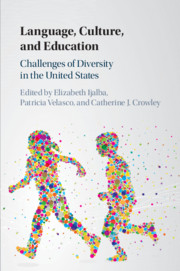Book contents
- Language, Culture, and Education
- Language, Culture, and Education
- Copyright page
- Dedication
- Contents
- Figures
- Tables
- Contributors
- Expanding Language and Ability Difference: A Foreword
- Acknowledgments
- Introduction to the Immigrant Experience
- Part I Immigration, Bilingual Education, Policy, and Educational Planning
- Part II Bilingualism, Literacy Ecologies, and Parental Engagement among Immigrant Families
- 4 Raising Children Bilingually: What Parents and Educators Should Know about Bilingualism in Children
- 5 Language Acquisition in Emergent Bilingual Triplets
- 6 Multilingualism in Chinese Families and Raising Their Children Bilingually: Fujianese Immigrants
- 7 Bilingualism in Korean-American Children and Maternal Perceptions of Education
- 8 Transgenerational Bilingual Reading Practices: A Case Study of an Undocumented Mixteco Family
- 9 Parent Education in Latino Families of Children with Language Impairment
- Part III Cultural Perceptions about Disability, the Home Language, and Healthcare Alternatives among Immigrants
- Epilogue
- References
- Index
8 - Transgenerational Bilingual Reading Practices: A Case Study of an Undocumented Mixteco Family
from Part II - Bilingualism, Literacy Ecologies, and Parental Engagement among Immigrant Families
Published online by Cambridge University Press: 11 March 2019
- Language, Culture, and Education
- Language, Culture, and Education
- Copyright page
- Dedication
- Contents
- Figures
- Tables
- Contributors
- Expanding Language and Ability Difference: A Foreword
- Acknowledgments
- Introduction to the Immigrant Experience
- Part I Immigration, Bilingual Education, Policy, and Educational Planning
- Part II Bilingualism, Literacy Ecologies, and Parental Engagement among Immigrant Families
- 4 Raising Children Bilingually: What Parents and Educators Should Know about Bilingualism in Children
- 5 Language Acquisition in Emergent Bilingual Triplets
- 6 Multilingualism in Chinese Families and Raising Their Children Bilingually: Fujianese Immigrants
- 7 Bilingualism in Korean-American Children and Maternal Perceptions of Education
- 8 Transgenerational Bilingual Reading Practices: A Case Study of an Undocumented Mixteco Family
- 9 Parent Education in Latino Families of Children with Language Impairment
- Part III Cultural Perceptions about Disability, the Home Language, and Healthcare Alternatives among Immigrants
- Epilogue
- References
- Index
Summary
- Type
- Chapter
- Information
- Language, Culture, and EducationChallenges of Diversity in the United States, pp. 139 - 158Publisher: Cambridge University PressPrint publication year: 2019



